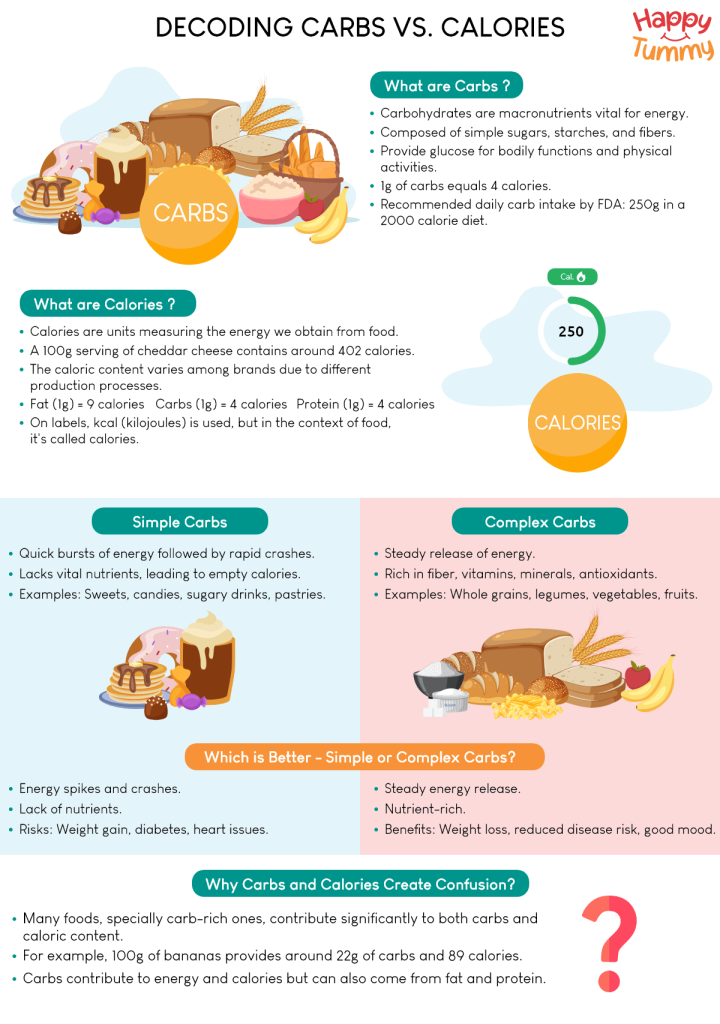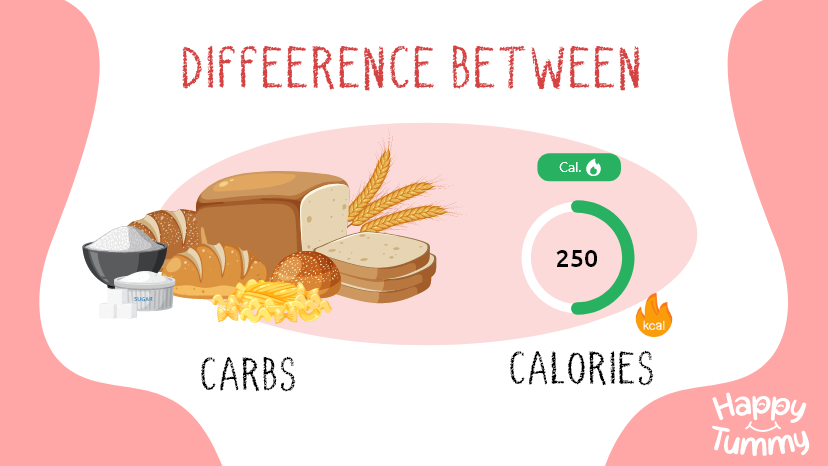Table of Contents
Carbs and calories – often, we confuse these two. The misunderstanding stems from the fact that carbohydrates contribute to the overall caloric content of food.
But apart from the similarity that carbs and calories start with C, there lies a big difference.
We’ll dive into the sea of carbs and calories, swim through the confusion, and come out with clarity.
What Are Calories?
Calories are a way to measure the amount of energy our bodies consume and burn. Think of them as a measuring unit. So, when we eat food of a certain weight and volume, we get energy from this. For example, a 100 gram of cheddar cheese contains approximately 402 calories.
Now, these calories will differ from brand to brand and type of cheese. It is because of the difference in the making process.
Also, different food items will give you different amounts of energy, or calories, based on their composition.
Here is how many calories we get from each gram of different nutrients:
- Fat (1 gram) – 9 calories
- Carbohydrate (1 gram) – 4 calories
- Protein (1 gram) – 4 calories
Calories are represented as ‘Cal’. 1000 calories are known as ‘Kcal’ or kilocalories. These are also known as Kilojoules.
On labels, you’ll see kcal written. But these are called calories when it comes to food.
Now, let’s understand how calories are different from carbs.
What Are Carbs?
Every food item in the world consists of macro and micronutrients. These nutrients are what nourish our bodies and help us live and hop happily.
We need a few nutrients in large amounts. These nutrients are called macronutrients. Then come the micronutrients that our bodies need in trace or smaller amounts.
Macronutrients provide most of the energy that we need to function. These nutrients include:
- Fat
- Protein
- Carbohydrates
Micronutrients, though are required in small quantities, play an important role in a lot of bodily functions. These include:
- Vitamins
- Minerals
- Phytochemicals
Carbs or carbohydrates, as we see, are macronutrients that provide us with energy along with sugar and starch. Not all macronutrients provide the same amount of energy. Carbs provide glucose which is converted to energy and then it supports bodily functions and physical activities.
For example, fats contain more than double the amount of energy we get from carbs or protein. Also, not all macronutrients serve the same function. Now, let’s understand why we need carbs.
Why do we need carbs?
Carbs are often hailed as our bodies’ primary source of energy. It is the simplest form of energy that is readily available to our bodies. Each gram of carb contains 4 calories. So, for example, if you are eating 100 grams of carbs, you are consuming 400 calories (100×4).
Carbs are generally divided into two categories:
- Simple carbs – These carbs are available in simplest form and our bodies do not have to work much to harness energy out of these. We get quick bursts of energy after taking them.
You may even call them simple sugars. Know that the sugar we are discussing here is not ‘white sugar’ that we use in the kitchen but the sugar that our body absorbs from the food we eat. White sugar is a form of simple carb. A few examples of simple carbs include fructose, glucose, lactose, white sugar, etc.
- Complex carbs – Unlike simple carbs, complex carbs have a complex molecular structure; thus, our bodies must work more to convert them into energy. For example, whole grains, vegetables, fruits, nuts, beans, etc. Complex carbs are often classified into starch and fibre.
To simplify this more for you, Carbs serve these functions that are necessary for our body
1. Help control blood glucose
2. Insulin metabolism
3. Helps in fermentation
4. Spares protein.
5. Takes part in various metabolism processes.
According to FDA in a 2000 calorie diet, 250g carbs is recommended (per day)
By their definition, it might seem that simple carbs are much better than their complex siblings. But here is the truth.
Which is better – simple or complex carbs?
Complex carbs are among the two types of carbs that we must eat. They benefit us. In contrast, if consumed in large amounts, simple carbs are harmful to our bodies.
Here is why:
Simple vs Complex Carbs
| Factors | Simple Carbs | Complex Carbs |
| Energy Release | Simple carbs load our bodies with quick bursts of energy. This is followed by a rapid crash of energy as well. | Complex carbs release energy smoothly and consistently. This steady release of energy makes us feel full and energetic for a long. |
| Nutritional Value | Simple carbs lack vital nutrients such as vitamins and minerals. These empty calories found in sugary snacks and beverages are harmful and lead to weight gain. | Food items that contain complex carbs nourish us with fibre, vitamins, minerals, antioxidants, etc. |
| Weight Gain | Due to insulin issues, our bodies convert simple carbs into fat and store it. It’s like a flash flood. This leads to weight gain and obesity. | Complex carbs, on the other hand, don’t load our bodies with quick energy spikes. Instead, we get energy from them like a sweet river flow. |
| Risk / Benefits | Weight gain, diabetes, heart issues, metabolic issues, etc. | Steady flow of energy, reduced risk of diseases, good mood, weight loss due to high fibre content, youth, and many other beneficial things. |
| Examples | Sweets, candies, sugary drinks, soft drinks, high-fructose corn syrup, malted foods, glucose, pastries, cakes, numerous breakfast cereals, processed foods, flavoured yogurt, etc.Check for labels and see if they contain added sugars. | Whole grains such as wheat, barley, oats; legumes; vegetables; fruits (consume in moderation); brown rice; quinoa; buckwheat, etc. |
To help you start, here’s a list of carbs that can help you in your weight loss journey:
- Black rice
- Sweet potatoes
- Quinoa
- Oats
- Chickpeas
- Apples
Why Are Carbs And Calories Often Confused?
The food that we eat mostly consists of carbs in higher amounts. For example, 100 grams of bananas provides us with around 22 grams of carbs and 89 calories.
If we go by the math of it, 22.8 grams of carbs will lend us 88 calories (22×4), which is almost all the calories it provides.
But some foods are high in fat or protein too. So, carbs provide us with calories and energy, but calories can even be gained from fat, protein, etc.
Concluding Carbs and Calories

While both carbs and calories share the initial ‘C,’ they play distinct roles in our nutrition.
Calories measure energy, with each gram of fat providing 9 calories and both carbs and protein supplying 4 calories per gram. Carbs, a vital macronutrient, offer quick energy (simple carbs) or sustained release (complex carbs).
Opting for complex carbs is wise. It’s because they bring numerous benefits and save us from the risks that come with excess simple carbs. The confusion between carbs and calories arises because many foods, especially carb-rich ones, contribute significantly to both carb grams and caloric content. But now the fog must’ve been cleared.
So, keep counting carbs and calories, be conscious of what you eat, and savour the nutritional dance!
FAQs
The choice between counting calories or carbs depends on individual health goals. Counting calories is a general approach to managing overall energy intake, while counting carbs may be preferred for specific dietary plans, such as low-carb or ketogenic diets. It’s essential to align your approach with your health objectives and consult a nutrition professional for personalized advice. For overall weight loss, both carbs and calories are counted for a holistic approach.
No, carbs and calories are not the same. Carbohydrates are one of the three macronutrients (along with proteins and fats) that provide energy to the body. Calories, on the other hand, are a unit of measurement for energy. Carbohydrates, proteins, and fats contribute to the overall caloric content of food, but they are distinct components of the diet.
Weight gain is primarily influenced by an excess of calories rather than a specific macronutrient like carbs. Consuming more calories than your body needs can lead to weight gain. While excessive consumption of refined carbohydrates also contributes to weight gain, a balanced diet and proper portion control are crucial for maintaining a healthy weight.
No, 1 calorie is not equal to carbohydrates. In terms of energy content, each gram of carbohydrates provides approximately 4 calories. Similarly, each gram of protein also provides 4 calories, and each gram of fat provides 9 calories apx. It’s important to consider a diet’s overall balance of macronutrients rather than focusing solely on one component.
Rice is a moderate-calorie food. The caloric content of rice depends on the type and preparation method. Brown rice, being less processed, often contains more nutrients and fibre than white rice but may have slightly more calories. Controlling portion sizes and choosing whole grains can contribute to a balanced diet.
Excessive consumption of refined carbohydrates, specially those with added sugars, can contribute to weight gain, including abdominal fat. However, not all carbs are equal, and whole, unprocessed carbohydrates, such as those found in fruits, vegetables, and whole grains, can be part of a healthy diet. A balanced approach considering overall calorie intake and food quality is crucial for managing belly fat.















